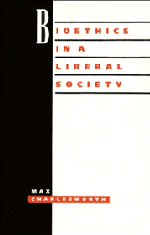4 - BEGINNING LIFE
Published online by Cambridge University Press: 03 May 2011
Summary
New ways of birth and family formation
Over the last thirty years there has been a profound shift in attitudes in societies in the Western European tradition towards marriage and the family, or rather to traditional means of family formation. This was set in train by ‘the change from prearranged marriages being the norm, to the general convention that the married should choose one another’, and this in turn was seen as a development in personal autonomy in family relationships. Of course, the great majority of children are born from, and most families are created by, heterosexual couples in formally married unions. Again, marriage and traditional family formation are still given powerful support by the law and by the public rhetoric of our society. Further, a number of alternative ways of family formation (for example, artificial insemination by donor and in vitro fertilisation) are used only by people who are infertile. In this sense donor insemination and in vitro fertilisation (ivf) are not preferred choices but choices of last resort.
Nevertheless, there is at the same time an acceptance — sometimes passive, sometimes more positive — in our society of alternative means of procreation and of family formation, even though some of these modes of having a family (for example, homosexual couples having children by means of artificial insemination) are still seen as being questionable, and even though many people adopt quite contradictory attitudes to them (for example, most people now accept single parent families and having children through artificial insemination by donor, but many still reject surrogate motherhood as a means of family formation).
- Type
- Chapter
- Information
- Bioethics in a Liberal Society , pp. 63 - 106Publisher: Cambridge University PressPrint publication year: 1993

